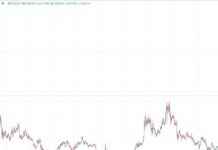The cryptocurrency market, especially decentralized finance (DeFi) and non-fungible tokens (NFTs), is constantly evolving. While price fluctuations play a significant role in shaping activity, other factors like time also influence changes in the industry.
Recently, there has been an interesting trend observed in Uniswap, a leading decentralized exchange (DEX) on the Ethereum network. According to Token Terminal, a blockchain analytics platform, trade sizes on Uniswap have been decreasing steadily. Over the past two years, the average trade size on Uniswap has dropped from around $30,000 to approximately $1,000. This decline in trade size could indicate a rising adoption rate among retail traders who prefer smaller trades due to limited resources compared to institutional investors.
One possible explanation for this trend could be the proliferation of meme coins on platforms like Base, which offer lower fees for trading. While Uniswap initially launched on the Ethereum network, it is now accessible on Base, Arbitrum, and Polygon as well, providing users with a low-fee environment for token trading. This accessibility to different platforms allows market participants to engage in smaller trades with reduced fee implications.
Additionally, the rise of alternative DEXs on blockchains like Solana and BNB Chain might also be diverting activity away from Uniswap. These platforms offer faster transaction speeds and lower fees compared to Ethereum, making them attractive to traders looking for efficiency and cost-effectiveness.
Despite the decrease in average trade size on Uniswap, the overall DEX activity has been on the rise. A report from Token Terminal indicates that there are currently 11.2 million monthly active traders across leading DEXs, including Uniswap. This surge in DEX users suggests a growing interest in decentralized trading platforms, even as trade sizes decrease.
Analysts remain optimistic about the future of Uniswap and its native token, UNI. The platform is set to launch Uniswap v4, and with the recent regulatory clarity surrounding Ethereum, including the impending launch of a spot Ethereum exchange-traded fund (ETF), the outlook for Uniswap appears positive.
In conclusion, the evolving landscape of decentralized finance and decentralized exchanges like Uniswap reflects a shift towards smaller trade sizes and increased retail participation. As the crypto market continues to mature, it will be interesting to see how these trends shape the future of decentralized trading platforms and their impact on the broader cryptocurrency ecosystem.









